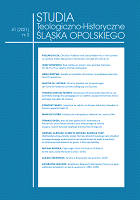Brak żałoby po śmierci żony proroka Ezechiela (Ez 24,15-27) w świetle retoryki hebrajskiej
The Lack of Mourning After the Death of the Prophet Ezekiel’s Wife (Ezek 24:15-27) in the Light of Hebrew Rhetoric.
Author(s): Jerzy BosowskiSubject(s): Cultural history, Ancient World, Theology and Religion, History of Judaism, Sociology of Culture, History of Religion
Published by: Uniwersytet Opolski
Keywords: Book of Ezekiel; Ezekiel’s wife; lack of mourning; Jerusalem temple; Hebrew rhetorical method; parallel-concentric structure;
Summary/Abstract: The context of the research was that different commentators on the Book of Ezekiel propose different structures for the text un-der study. E.g., D.I Block in the text of Ezek 24:15-27 proposes the structure: (v. 15) - the formula of the word event; vv. 16-24 and 25-27 - the main parts; it ends with the formula of knowledge (vv. 24.27). M. Greenberg divides the text into two parts: A (vv. 15-24) with sub-parts: A1 (vv. 16-17) - God speaks to the prophet; A2 (vv. 18-24) - the prophet speaks to the people; part B (vv. 25-27) - announcing the end of the prophet’s state of non-speaking. B. Tidiman sees a parallel-concentric structure: A (v. 16a) - the announcement of the death of his wife; B (vv. 16b-17) - the prohibition of mourning given to Ezekiel; C (v. 18) - the fulfilment of the announcement of the death of his wife; D (v. 19) - the question of the ex-iles; C’ (vv. 20-21) - the fulfilment of the fate of Jerusalem; B’ (vv. 22-23) - the prohibition of mourning after the fall of Jerusalem; A’ (v. 24) - the prophet’s conduct an example for the people. Therefore, the aim of the research became the discovery of the structure that the inspired author included. The method of Hebrew rhetoric developed by Roland Meynet was applied. Score reached: A (v. 16ab - “the object of desire of your eyes”), B (v. 19b - ques-tion), C (v. 21cd - “the delight of your eyes”), B’ (v. 24Abc - answer), A’ (v. 25bc - “the de-light of their eyes”). The image of God that emerges from the examined text is the Almighty God. A God who, for the sake of a kind of pedagogy, is ready to destroy the only sanctuary dedicated to Him. He does this because of the unfaithfulness of the “house of Israel”, which practised idolatry in this temple.
Journal: Studia Teologiczno-Historyczne Śląska Opolskiego
- Issue Year: 41/2021
- Issue No: 2
- Page Range: 37-60
- Page Count: 24
- Language: Polish

